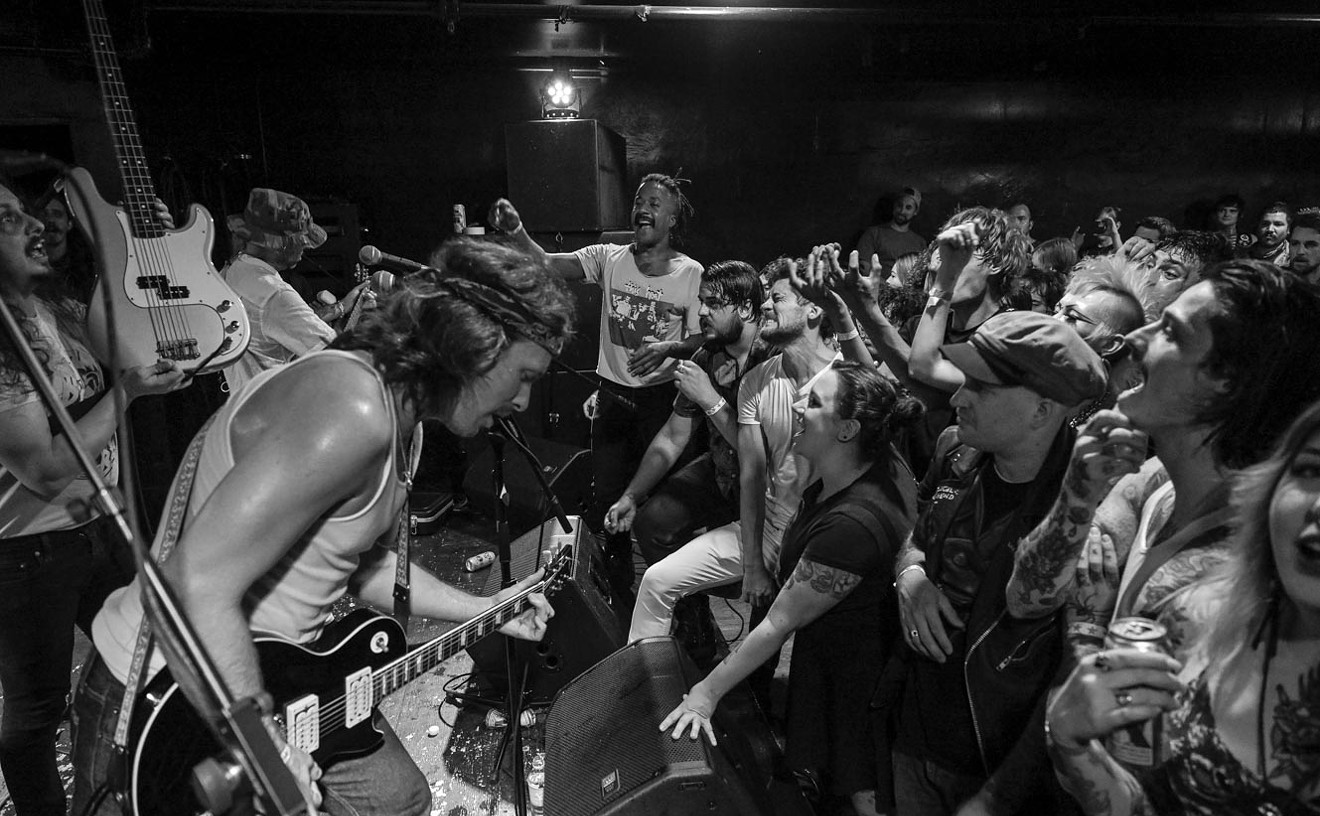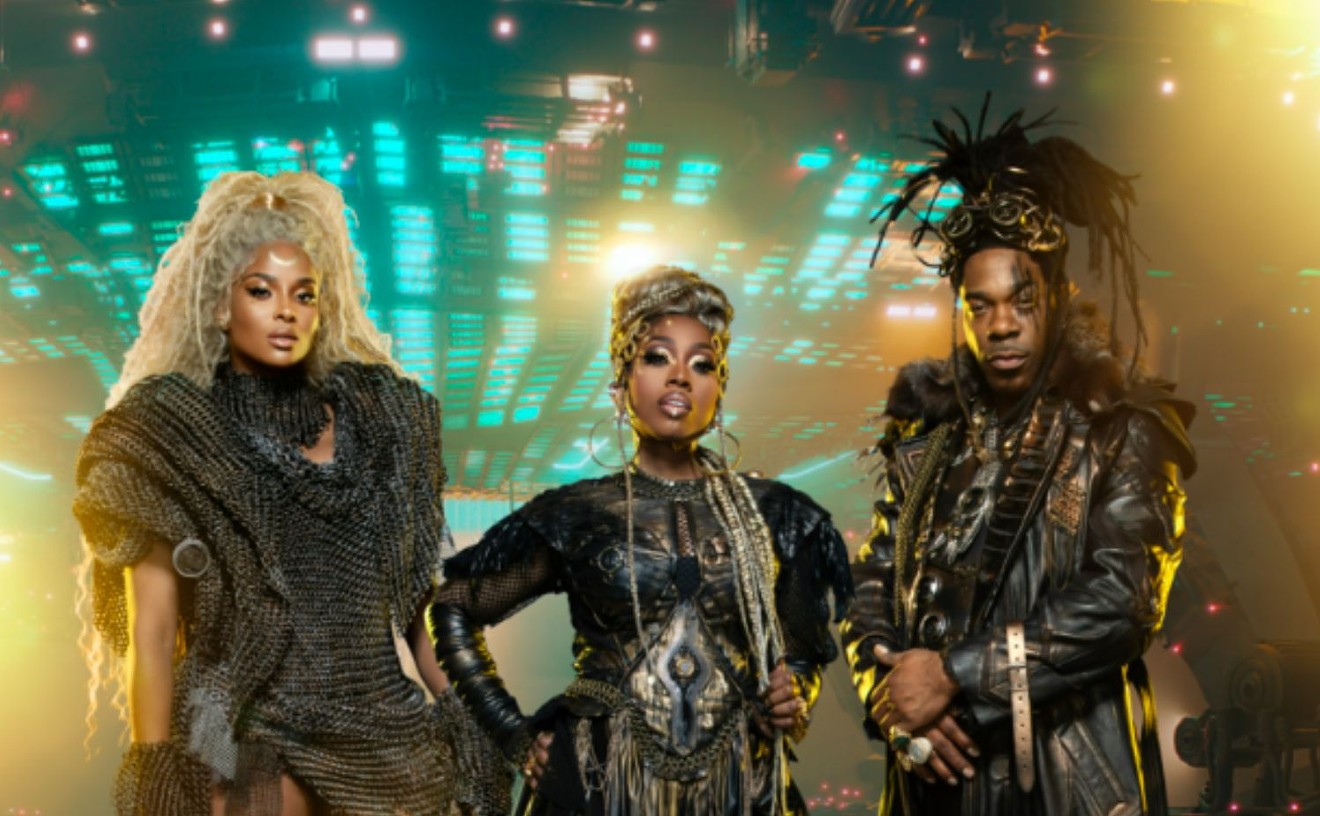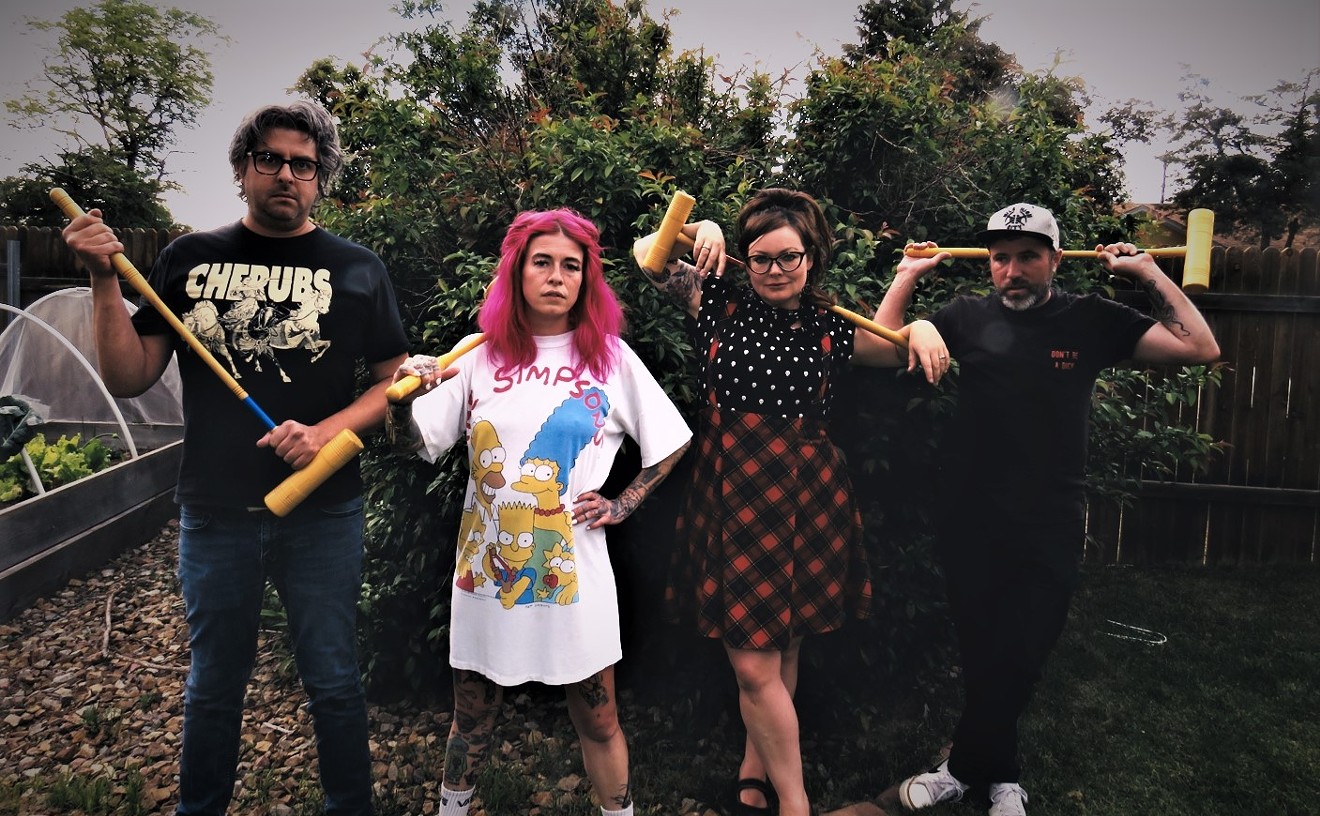KMFDM (originally Kein Mehrheit Für Die Mitleid) started as a performance-art one-off in 1984 that evolved into an ongoing endeavor. Founding member Sascha Konietzko was joined by drummer and vocalist En Esch, who formed the core of the band until its temporary split in 1999. With various collaborators, KMFDM developed its signature melding of electronic industrial music and hard rock, which has often been imitated but seldom equaled.
See also: - KMFDM at Summit Music Hall, 3/27/13 - Photos: KMFDM at Summit Music Hall, 8/10/11 - After more than twenty years, KMFDM still gets the last laugh
The peak of the band's commercial popularity came following the release of Nihil in 1995, which spawned the soundtrack-friendly hit single "Juke Joint Jezebel." What has kept the group interesting is its visceral live shows and its songs, which feature tongue-in-cheek, genuinely clever lyrics that take aim at sociopolitical ills in the world -- that and KMFDM's willingness to poke fun at itself. We recently had a chat with the always engaging and articulate Konietzko about the impact of Wax Trax on his career, Kunst, and covering U2's "Mysterious Ways."
Westword: When did you start making music of your own?
Sascha Konietzko: I started playing music kind of when I was a kid. I played bass in a couple of bands in school. It was punk-rock stuff. Nothing of any noteworthiness. Then I pursued a career in photography and visual things. By coincidence, I came around to doing music again. It wasn't planned; it just kind of happened.
The first KMFDM show was kind of a performance art piece. How did you become involved in that sort of thing?
I was friends with a guy that was part of a group of painters and sculptors that were called First Aid. They were invited to some gig in Paris, some opening performance of a show of young European artists. I was the driver for the whole enterprise because I was the only guy that wasn't stoned or drunk all the fucking time. Somehow, as we were driving, they found out I also played bass guitar.
Then the idea arose to accompany their performance, which consisted of pouring about a ton of potatoes down some large steps and smearing concrete over some glass entry hall doors. I accompanied them with some sound thing, and that just became the way we did the next performances. Then I met some guy who had a studio, and then I started recording with the guy. That's how it all began.
How did you come to work with Adrian Sherwood on Don't Blow Your Top?
Adrian was a guy I knew from when he came to Hamburg frequently to mix concerts of Mark Stewart & The Mafia, and I talked to him and got to know him. We went to London and had him work on a couple of tracks, and we became friends.
What do you think he brought to that album?
His name. That was important enough to raise some eyebrows in the U.K. That, I think, really helped to facilitate licensing with Wax Trax Records in Chicago. I didn't know at the time, but he had worked with Al Jourgensen on at least one album.
Certainly on Twitch.
Yeah, Twitch for sure. So yeah, that all kind of happened unbeknownst to me, because when I came to the US in 1989, when I sat down with Jim [Nash] and Dannie [Flesher] from Wax Trax, they were like, "We want to sign KMFDM directly." I said, "Why would you want to do that?" They said, "We licensed these two albums through this English company already, and we sold like seventy thousand copies already." I said, "What the fuck are you talking about?" I had difficulty selling five hundred copies in Germany, you know? They said, "Oh, you're totally established over here." I fucking had no idea.
Continue reading for more from KMFDM.
You've spoken in the past about your move from Germany to the U.S. in 1991. Before that, what kinds of shows had you played in a place where you could barely sell five hundred copies of an album?
We opened for [Einstürzende] Neubauten frequently, I seem to remember. They kind of always took us out for little stints here and there. We opened for Young Gods, and we did some co-headlining, tiny tour, maybe three shows, with Borghesia, who were also on Wax Trax back then. Just playing the rounds of the European total underground scene, we would play for a case of beer here and there. Pretty funny. After that Ministry tour in the U.S. in 1991, we toured the U.S. headlining with Braindead Sound Machine opening, and everything fell into place.
It was a lot of luck and being at the right place at the right time. I was reminiscing with Al the other day -- I was down in El Paso a couple or three days ago, and it occurred to me for the first time that actually there were no other German bands on Wax Trax Records. We were the only German import they did, really, if I'm not totally mistaken. The closest to us would be Pankow at the time -- an Italo-German singer, Alex Spalck.
How did you get connected with Aidan "Brute!" Hughes and what do you feel it is about his aesthetic that suits the music you make?
The first album we released, What Do You Know, Deutschland?, I went to London and basically made the rounds at all the record labels. And I dropped off a copy at Mute Records. A couple of weeks after that, some guy from Liverpool called me up and said that he saw the secretary at Daniel Miller's office pop a record into the trash. He looked at it and found the cover art interesting. It had a picture of Irina Gorbachev on it. He took it home, listened to it, and deciphered how to contact me, and then said he wanted to re-release the record for the U.K. but with a different cover.
I went back to the U.K. and met this guy Aidan, and I liked his stuff. We stayed in touch, and the next record, his stuff was on the cover, and the next one, and the next one, and the next one. It became the visual [style] of the band, really. Again, a total piece of luck because his stuff is so recognizable that it inevitably branded the look of KMFDM. We wouldn't have known what to do for those covers if not for him.
For the song "Kunst," the title track of the new album, is obviously made up entirely of self-referential words like bits of lyrics, album titles and the like. Why did you do that? It's almost like certain hip-hop songs where the artists reference themselves.
It's a little bit of a thread that goes through the history of KMFDM. And, exactly, you mentioned hip-hop. We started this self-referencing thing leaning on the whole hip-hop tradition, which I guess was done so people on the dance floor didn't have to go up to the DJ and ask, "Who is it?" because it was always kind of said.
On that particular song, I was just telling the story of when KMFDM came to the U.S. the first time, and we were always asked, "What does it stand for? What does it stand for?" And I always had to come up with this long-winded explanation, you know, "It stands for kind of song long German phrase that then translates as blah."
And one of Ministry's guitar roadies said, "Why do you go through the trouble every time? Just say, 'Kill Mother Fucking Depeche Mode.'" And as I was telling this guy this story, I was like, "Hey, man, there's never been a song with 'Kill Mother Fucking Depeche Mode' in it." About ten minutes later the lyrics for the song were written, and that is that.
Continue reading for more from KMFDM.
That guitar roadie wasn't the one for Mike Scaccia was it?No. Poor Mikey. I just saw him in July, and I said, "Hey, Mikey, you don't look a day older than when I saw you 22 years ago!" Hey, man, what a way to go. In the middle of a lead.
You have a song on the new album called "Pussy Riot," and one might suppose the cover art is a nod to that as well. Why did you feel compelled to make such a statement about that band?
Because it's outrageous. You don't put young ladies like that into jail for just speaking their mind. I guess Putin does. Fuck that guy.
What did you feel was the significance of that band has been?
I don't think there's much significance to Pussy Riot at all other than they did what they did, and that catapulted them onto the headlines of pretty much every news magazine in the world. And they have [guts] and now they have to pay dearly for it. So it's a bit of a shout of solidarity. Every night we perform that song, and every night after the song, someone in the audience yells, "Free Pussy Riot!" I don't even have to say it.
The song "The Next Big Thing" is a clever abstracting of one idea from one context to another though directly related drawing a parallel between the music industry and marketing with corrupt international banking. Later on in that song, though, there is an interesting line that goes, "The wretched masses and the shit you believe," which seems to be a self-critical statement as well. Why did you feel that was important to add that in there?
The thing is the lyrics of the song were not written by me but [William] Wilson, so that would be a question to really ask him. I noticed the same thing and was intrigued and thought it was cool. At the same time it was so damned serious, and being so damned unserious as I am, I had to add my insane laughter and "Yee haw!" just to lighten up the whole thing. KMFDM is always serious then completely silly at the same time. Which I think is important. I'm very serious about what I'm doing, but I don't take [myself] very seriously.
You've long had male and female vocals in your music. What about that do you think enhances the music for you?
I guess I'm coming from a sort of background of funky, hip-hoppy, glammy, krautrock-y stuff. The idea of having female vocals was always kind of intriguing insofar as a stark contrast to the belching, barking kind of serious male performances. It's been an early-on component in the mix that makes KMFDM. I can't really say everything was thought-out and done on purpose. There's a lot of stuff that happened and then maybe happened again, and then it just became a staple. Sort of like if you've got a good thing going, why fuck with it?
As a keyboardist and producer who has been through an early phase of industrial music through today, what do you do today that is different from when you started in creating the music?
It's not really that different. Right now the equipment in my studio was last updated in 2001 or so. I use a very old digital work station. The songs kind of happen the same way. It always begins with a sound or a rhythm or both -- a rhythmic sound -- something that I find intriguing. That's always the cornerstone of making a new song. Then I add to it, then I fiddle around with it and then look at my libraries and find something that goes well with it. It's like playing with Legos. It's like cooking at the same time, too. You find something while you're shopping and then you go, "Oh, what would go well with that?"
On the Agogo compilation is your cover of U2's "Mysterious Ways." Why did you cover that song in particular?
We had read somewhere that U2's The Edge was heavily into KMFDM during the making of Achtung Baby and then we were just reciprocating, "Yeah, cool. We like 'Mysterious Ways.'" It was a very catchy song that caught our ear, and we decided to do a cover version. Someone from our label called up U2's management and got clearance for the sample to use. I guess we used the intro sample of the song. It was just like an homage to U2, and at the same time it was a clever marketing trick.
Follow @Westword_Music











